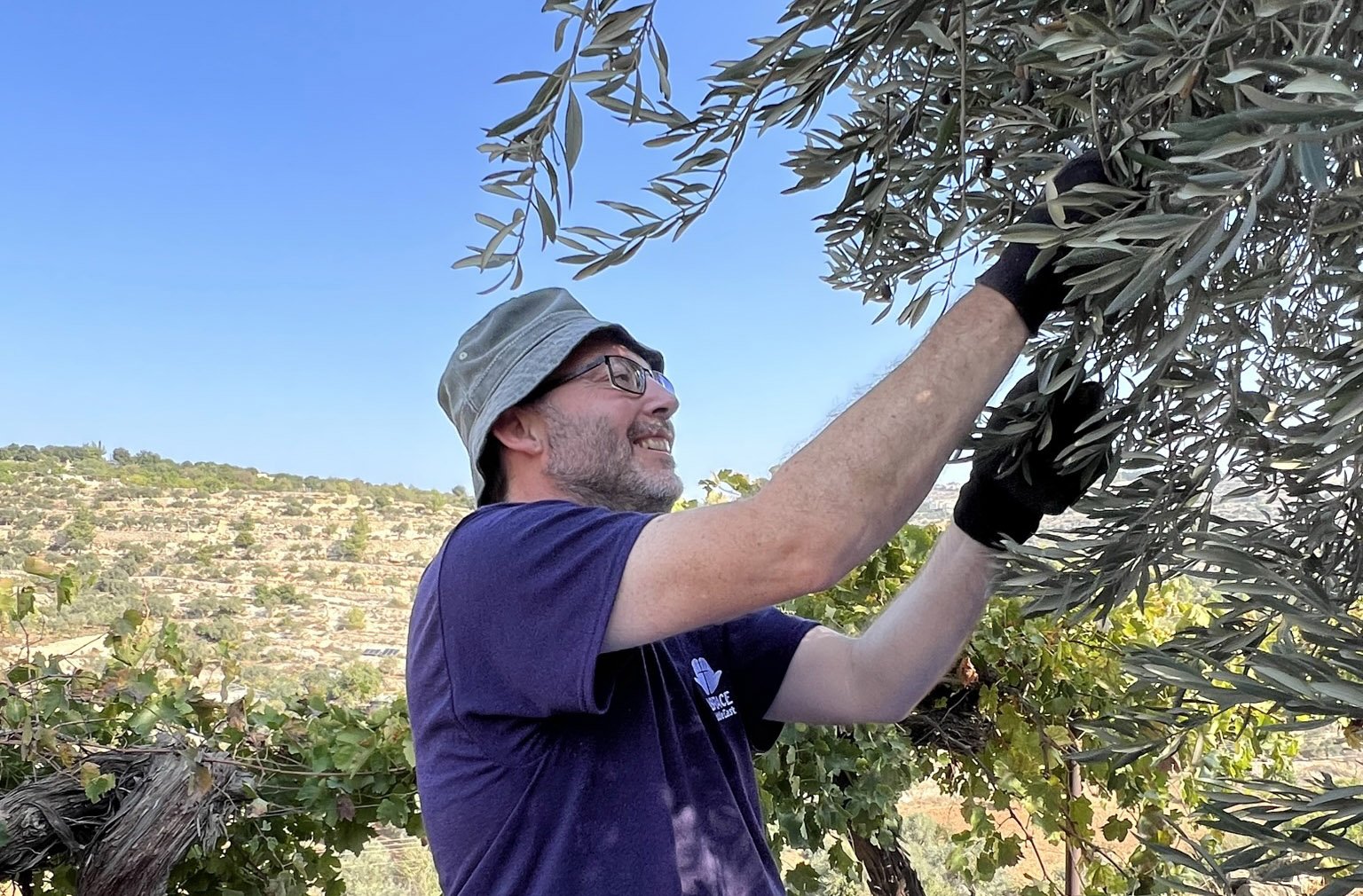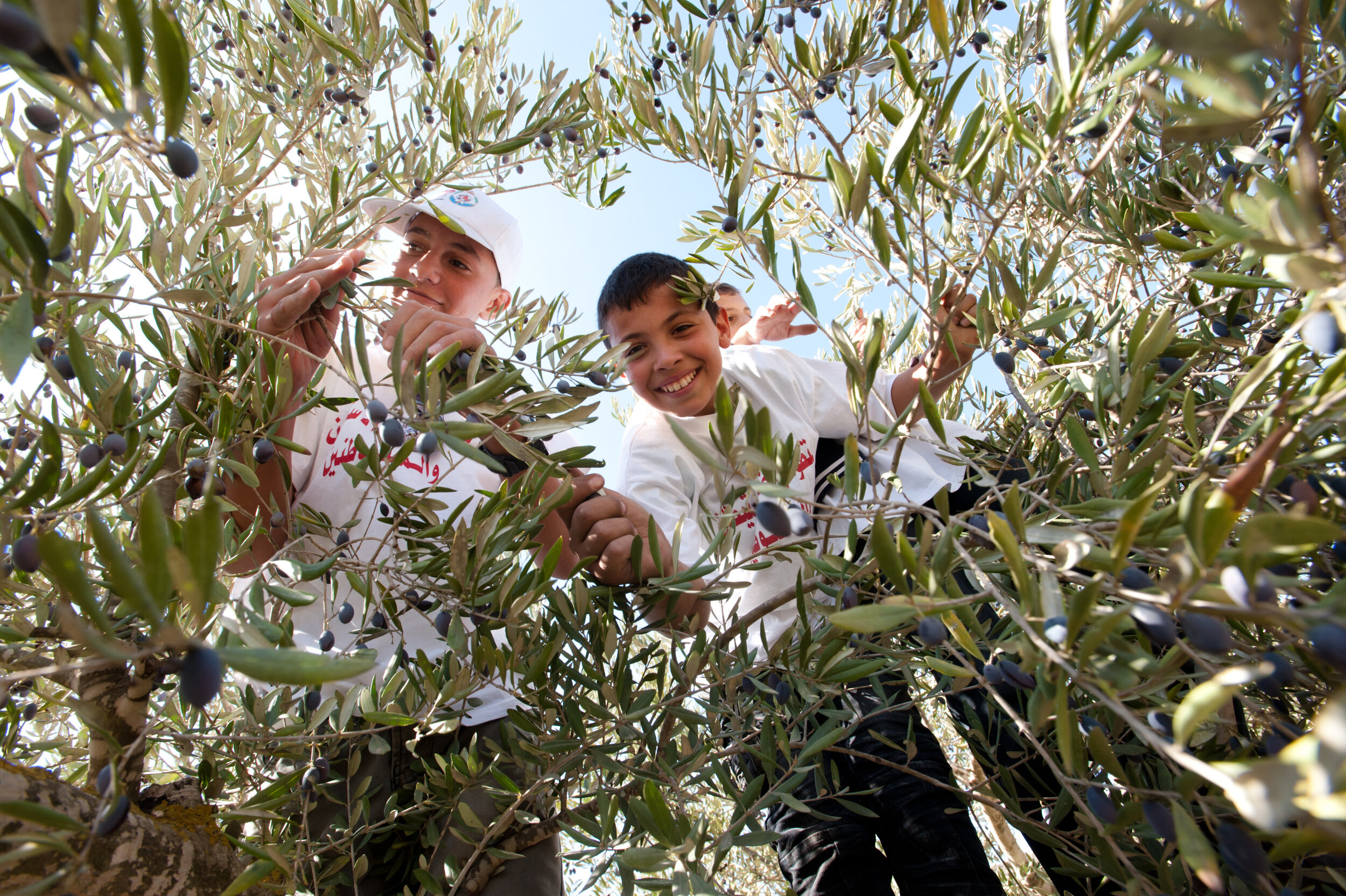The olive tree: a symbol of peaceful resistance
March 2022
For the first time since the pandemic began nearly two years ago, Embrace was able to take a group of volunteers to the Holy Land to assist with the planting of olive trees in Palestine.
Here, our very own Rowena reflects on what it was like to return to Palestine after such a long absence, and how the olive tree continues to serve as a powerful symbol of peace in this conflicted and contested land.
At the beginning of February, I travelled to Palestine with Embrace CEO Tim, and two of our supporters, as part of a group taking part in the Olive planting programme with the East Jerusalem YMCA. We stayed in Beit Sahour, a town east of Bethlehem, and joined Palestinian farmers on their land to help them plant olive trees, as well as hear their stories and meet with organisations to learn more about the situation. We also visited Jerusalem and Hebron and met with some of Embrace’s partners to hear about some of the vital work they do.
I first travelled to the Holy Land in October 2019, and having heard and read about the situation in Israel and Palestine, I thought I knew what I was expecting, but seeing it with my own eyes was so different. I felt similar this time; things have changed since I was last there, and nothing really prepares you for the personal stories you hear from locals. Since my last visit, more Israeli settlements have been illegally built on Palestinian land, more house demolitions have occurred, and even more are under threat.
The Olive Tree project is one way that Embrace and our supporters show support to Palestinians. Olive trees are a universal symbol of peace and a powerful symbol of Palestinian rootedness in their land. The average lifespan of an olive tree is 300-600 years, but some can live as long as 3,000 years. They are at constant risk of settler attacks, but planting olive trees helps Palestinian farmers to prove that their land is in use, making it less susceptible to being taken. Being able to play a small part in supporting them was a privilege. We met so many wonderful, hospitable Palestinian people, who remain filled with hope despite the injustices they suffer on a daily basis.
On our first day of planting, we were in a village called Wadi Fukin, a village 5 miles southwest of Bethlehem. Karim owns the farm, along with his 3 brothers. He told us of a recent attack by settlers in which all his olive trees were burnt, so we were planting more to replace them. Karim said “we thank you a lot for your support and standing with Palestinians. Our village is surrounded by settlements but your visit not only supports our family, but the whole Palestinian cause.”
Another farm which we planted on belongs to the Sarras family. The father works his land with his wife, daughter and two sons. As we ate a delicious lunch the family had prepared, they told us about their innovative business. All their vegetables are grown organically, and unused vegetables are composted, or turned into biogas, fuelling the farm kitchen. The family produce organic products such as wine, honey, vinegars and oils, and sell them on the farm. They also invite people in to help on the land and teach them about their project. Despite the threats around them, the farmer feels called to continue to care for creation and contribute to Palestinian society. It was one of the many examples we saw of peaceful resistance.
While in Jerusalem, we drove through the Sheikh Jarrah neighbourhood, which felt surreal given how much I have seen and read about it on the news, and that it was at the centre of violence that flared up in May of last year. In Sheikh Jarrah we were shown houses that have been demolished and others which are under imminent threat of demolition.
At one point we stopped and saw a house that had been demolished by the Israeli government in December; the home of a newly married couple. We met the young man, and were welcomed by his aunt and uncle, whom we shared a cup of tea with while they told us their story.
I was also introduced to “self-demolition”, which is carried out by some Palestinians. If they know their home is under threat of demolition, it is cheaper for them to do it themselves rather than wait for the Israeli government to do it without much notice and have to bear a greater financial cost.
We also visited Hebron, which is known for its settler violence. We visited a street which Palestinians are not allowed to walk down, and saw some homes which had ladders outside the windows, because the front doors have been boarded up by settlers, preventing their owners from entering.
Our group met with some of Embrace’s partners to see and hear about the important work they are doing in the region. I have been working with Embrace’s partners for nearly 4 years and am familiar with the work of the YMCA and our Rehabilitation Programme, but hearing first-hand the experiences of those in the region continues to shock me. We met with Rami Khader, director of the rehabilitation programme, and we all sat listening, extremely moved, as he told us how his older brother was taken by Israeli soldiers at the age of 17, on Christmas Eve, in the middle of the night, and held in prison for 15 years. Shockingly, most Palestinian men have been imprisoned at some point in their child or adulthood.
We are extremely grateful to our friends at the East Jerusalem YMCA for the hugely important work they are doing. Planting and harvesting olive trees is one of the ways in which Palestinians show peaceful resistance, and in supporting the Olive Tree Project, Embrace supporters are playing a small but important role in supporting Palestinian people.
"Come and see” is the invitation from all the Palestinians we met, and I could not recommend this more for anyone who has an interest or wants to find out more. If and when you do, I am sure that the call to “go and tell” will be equally strong on your heart.
By Rowena Worthington, Programmes and Public Engagement Coordinator at Embrace the Middle East
OLIVE HARVEST TRIPS
If you’re interested in joining a future Olive Harvest Trip email visit@embraceme.org find out more.




